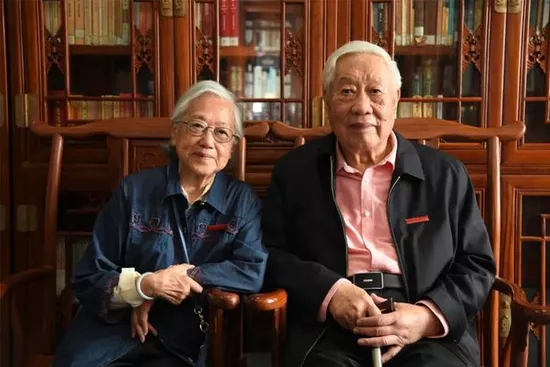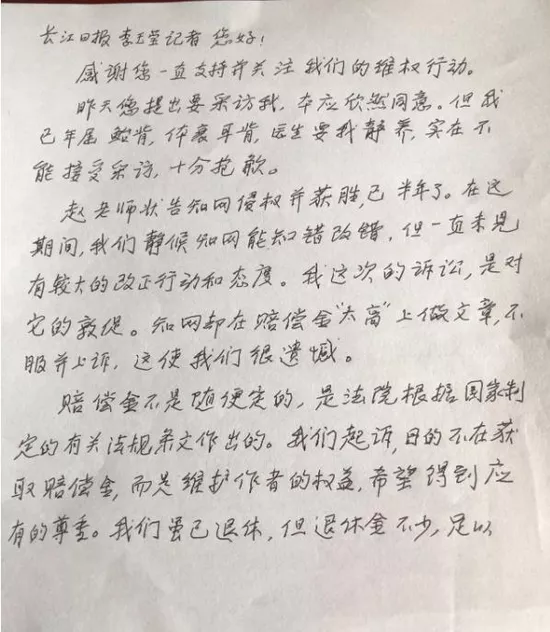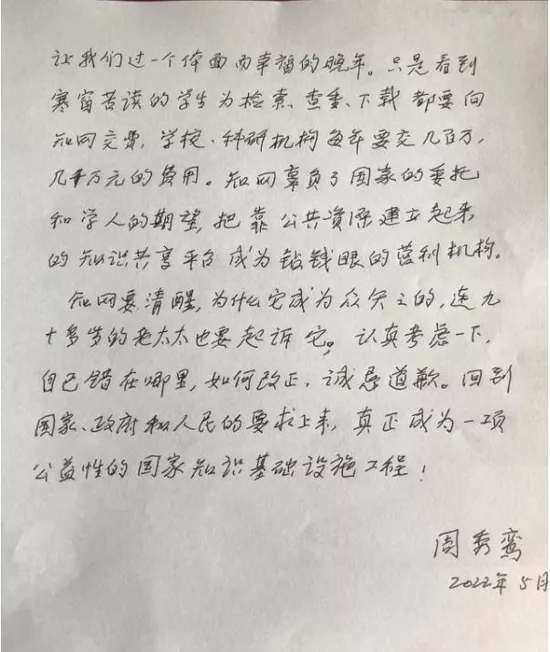On May 13, the website of the State Administration of Market Supervision issued a notice saying that on the basis of preliminary verification, a case of suspected monopoly of HowNet was filed for investigation. Subsequently, HowNet issued an announcement in response to the investigation, saying that it would fully cooperate, deeply introspect and thoroughly rectify. When it comes to the troubles of HowNet, people naturally think of the old man who "pried" HowNet - Zhao Dexin, a retired professor at Central South University of economics and law.
Reporter Li Chenyang Xu keying editor He Tao
On May 13, China Science Daily learned from Professor Zhao Dexin that HowNet apologized on the afternoon of May 12 and expressed its willingness to re launch his paper works with his wife Zhou xiuluan.
Zhao Dexin told China Science Daily that after their husband and wife sued HowNet for infringement, the latter not only removed their works involved in the case, but also all the works not involved in the lawsuit.
He once offered to HowNet to restore these works, but the other party has ignored them. It was not until his wife won the lawsuit that they got a response in recent days.
"They hope that we will first issue the authorization letter for the work to be put on the shelves. However, according to the suggestion of the lawyer, we will sign the relevant agreement after careful consideration and on the premise that both parties are sincere enough." Zhao Dexin said.
About a week ago, China judicial documents network published 10 civil judgments of second instance made by Beijing Intellectual Property Court on the dispute between China Academic Journal (CD version) electronic magazine Co., Ltd. (i.e. the organizer of HowNet) and Zhou xiuluan over infringement of the right to network communication of works information. The court ruled that HowNet constituted infringement on four academic papers written by Zhou xiuluan, compensated Zhou xiuluan for corresponding economic losses, and rejected all appeals of HowNet.
Zhou xiuluan, who won 10 lawsuits in one breath, is the "hard core old man" - Zhao Dexin's wife who pushed HowNet into the vortex of public opinion on her own last year. It is reported that the academic couple are retired professors of Zhongnan University of economics and law. Zhao Dexin is 90 years old and Zhou xiuluan is 93 years old.
At the end of 2021, Zhao Dexin sued HowNet for infringement, which caused an uproar. He accused HowNet of reprinting more than 100 papers without his authorization, and never paid any royalties. Even the author had to pay for downloading his own papers. Finally, the court ruled that Zhao Dexin won the lawsuit and was compensated for economic losses totaling more than 700000 yuan in accordance with the law. However, after the two old people won the lawsuit, HowNet took all their signed papers off the shelves respectively.
Recently, HowNet's attitude seems to have changed. It sent staff to apologize and claimed that it hoped to get the legal authorization of the second old man as soon as possible in order to put their signed papers on the shelves again.
Professor Zhou xiuluan suffered from hearing loss, so Professor Zhao Dexin, on behalf of the couple, accepted an interview with China Science Daily on this matter.

Photos provided by Zhao Dexin and Zhou xiuluan
China Science Daily: in the judgment recently published on the Chinese judicial documents online, a number of papers involved in the case were completed jointly by professors Zhao Dexin and Zhou xiuluan. Why did you choose to give up a series of substantive rights to claim the work and Sue in the name of Mr. Zhou in this lawsuit
Zhao Dexin:
Professor Zhou xiuluan and I are a couple. We have the same major and work in the same unit for a long time, so many academic achievements are completed by our cooperation.
We decided to sue in her name. On the one hand, it reflects my respect for her, on the other hand, it also has "technical" considerations. The Internet court stipulates that no more than four articles can be sued at a time. I have more articles and her articles are less. In order to shorten the litigation process, we put the article of our cooperation on her side to sue.
At first, teacher Zhou didn't particularly understand. Persuade me that we are old, we are not short of money, and we are worried about my health. I told her that it was not a matter of money, it was a matter of "power", it was a matter of safeguarding one's own rights. She understood and later supported me.


Professor Zhou xiuluan explained his original intention of safeguarding rights in a handwritten letter to the reporter of Changjiang Daily
China Science Daily: will this behavior of taking the author's works off the shelves once it involves litigation disputes hinder the steps of many people in safeguarding their rights
Zhao Dexin:
- There are examples around me. Many of my articles were signed by collaborators. At that time, some collaborators said they were unwilling to authorize me to file a lawsuit. The reasons can be summarized as "three fears": first, they were afraid that CNKI would take his articles off the shelves; Second, fear that the newly published articles will not be included by HowNet; Third, I'm afraid that even journals will no longer include his articles. Because many journals also cooperate with HowNet, I received a call from the editor in chief of the journal. They hope I withdraw the lawsuit and don't tell HowNet.
Several of us have retired, and many papers have been disseminated for decades. Peers know where to get these works. But for young researchers, the above problems can not be ignored.
China Science Daily: at present, the two teachers have basically won the lawsuit against HowNet. Do you have any other lawsuits going on
Zhao Dexin:
We haven't finished our lawsuit with HowNet. Besides the thesis, there is also a very important case.
As early as 2006, HowNet signed a contract with me to make the dictionary of China's economic history into an electronic version. The contract stipulates that if users pay to download the dictionary or its entries, they will give me a part of the money, about one yuan and thirty cents each. The contract clearly states a collection account, but I haven't received any money in this account. Recently, we confirmed that this account still works normally.
So where did the money go? I specifically went to consult this question and learned that HowNet had privately established a bank account in my name and forged my signature without my consent.
This matter has violated the criminal law. I have entrusted a lawyer to file a lawsuit.
China Science Daily: at present, your husband and wife win the lawsuit. How much does HowNet lose
Zhao Dexin:
There are more than 700000 on my side and less than 100000 on Mr. Zhou's side.
China Science Daily: are you mainly aiming at protecting rights of HowNet? Or are other academic websites and other platforms also involved
Zhao Dexin:
I didn't target HowNet. I also sued Beijing Wanfang and others. Everyone is staring at HowNet's case because HowNet has the greatest influence.
It can be seen that this kind of infringement of academic works online communication is a common phenomenon in China.
China Science Daily: what is the most ideal result expected by the two teachers for the series of rights protection work carried out by HowNet
Zhao Dexin:
Our wish is certainly not to let HowNet collapse. I don't want this situation of dominance of academic journal websites. I hope to build and manage knowledge platforms in accordance with the principles of socialist market economy. If you use the author's article, you should pay a certain remuneration. Accordingly, users who download articles from your website should also pay a certain fee. However, the profits obtained by the platform should comply with national policies, and there should be no current phenomenon of huge profits, eating at both ends and rising prices.
China Science Daily: HowNet has renegotiated with the two teachers about putting the works on the shelves. Are you satisfied with the result
Zhao Dexin:
The staff of HowNet told me that they had a new leader, and I felt that the new person had a new attitude. However, we will carefully observe whether the sincerity of the other party is enough.
Is the behavior of off shelf papers legal after HowNet lost the lawsuit? This is an issue of general concern in academic circles. In this regard, China Science Daily interviewed lawyer Li Weimin, director of Beijing Weibo law firm, and asked him to answer from a legal perspective.
China Science Daily: what are the so-called "violations" in the judgment? Is the plaintiff's work off the shelves of HowNet a further infringement
Li Weimin:
The agreement between HowNet and relevant magazines is not enough to prove that the magazine has obtained legal authorization from the author, nor is it enough to prove that HowNet has obtained legal authorization from the author through the magazine, that is, HowNet may have obtained authorization from the magazine, but has not obtained authorization from the author of a single article in the journal.
Therefore, without the permission of the author, HowNet provided the download and reading services of the works involved to the unspecified public at each port of its HowNet, which infringed the obligee's right to the information network communication of the works involved, and should bear the liability for tort compensation.
In practice, once the infringement of a general website is established, it is due to stop the infringement off the shelf. But HowNet has its particularity. According to its official website, HowNet currently has 27000 institutional users in more than 50 countries and regions around the world, with an annual total of 2 billion documents downloaded. Its users include university scientific research, party, government, enterprises and their think tanks, public security, procuratorial and legal forces, medicine and health, primary and secondary schools and rural areas, of which 76% of the world's top 500 universities are university users. It has formed an absolute monopoly of academic resources. Therefore, from the perspective of antitrust law, HowNet directly refused to have commercial exchanges and took the works off the shelves after losing the lawsuit, which infringed on the author's rights.